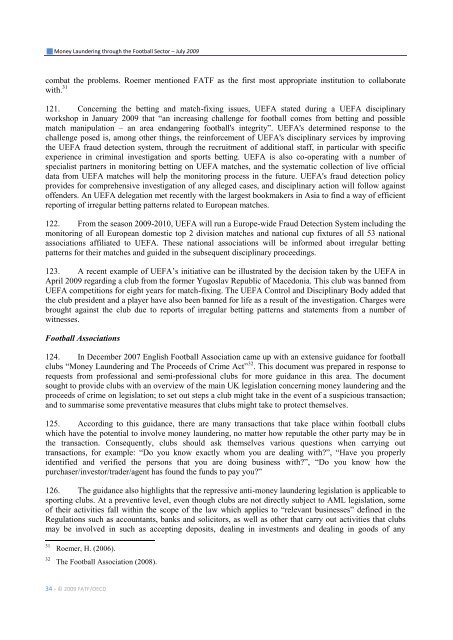Money Laundering through the Football Sector
Money Laundering through the Football Sector
Money Laundering through the Football Sector
Create successful ePaper yourself
Turn your PDF publications into a flip-book with our unique Google optimized e-Paper software.
<strong>Money</strong> <strong>Laundering</strong> <strong>through</strong> <strong>the</strong> <strong>Football</strong> <strong>Sector</strong> – July 2009<br />
combat <strong>the</strong> problems. Roemer mentioned FATF as <strong>the</strong> first most appropriate institution to collaborate<br />
with. 31<br />
121. Concerning <strong>the</strong> betting and match-fixing issues, UEFA stated during a UEFA disciplinary<br />
workshop in January 2009 that “an increasing challenge for football comes from betting and possible<br />
match manipulation – an area endangering football's integrity”. UEFA's determined response to <strong>the</strong><br />
challenge posed is, among o<strong>the</strong>r things, <strong>the</strong> reinforcement of UEFA's disciplinary services by improving<br />
<strong>the</strong> UEFA fraud detection system, <strong>through</strong> <strong>the</strong> recruitment of additional staff, in particular with specific<br />
experience in criminal investigation and sports betting. UEFA is also co-operating with a number of<br />
specialist partners in monitoring betting on UEFA matches, and <strong>the</strong> systematic collection of live official<br />
data from UEFA matches will help <strong>the</strong> monitoring process in <strong>the</strong> future. UEFA's fraud detection policy<br />
provides for comprehensive investigation of any alleged cases, and disciplinary action will follow against<br />
offenders. An UEFA delegation met recently with <strong>the</strong> largest bookmakers in Asia to find a way of efficient<br />
reporting of irregular betting patterns related to European matches.<br />
122. From <strong>the</strong> season 2009-2010, UEFA will run a Europe-wide Fraud Detection System including <strong>the</strong><br />
monitoring of all European domestic top 2 division matches and national cup fixtures of all 53 national<br />
associations affiliated to UEFA. These national associations will be informed about irregular betting<br />
patterns for <strong>the</strong>ir matches and guided in <strong>the</strong> subsequent disciplinary proceedings.<br />
123. A recent example of UEFA‟s initiative can be illustrated by <strong>the</strong> decision taken by <strong>the</strong> UEFA in<br />
April 2009 regarding a club from <strong>the</strong> former Yugoslav Republic of Macedonia. This club was banned from<br />
UEFA competitions for eight years for match-fixing. The UEFA Control and Disciplinary Body added that<br />
<strong>the</strong> club president and a player have also been banned for life as a result of <strong>the</strong> investigation. Charges were<br />
brought against <strong>the</strong> club due to reports of irregular betting patterns and statements from a number of<br />
witnesses.<br />
<strong>Football</strong> Associations<br />
124. In December 2007 English <strong>Football</strong> Association came up with an extensive guidance for football<br />
clubs “<strong>Money</strong> <strong>Laundering</strong> and The Proceeds of Crime Act” 32 . This document was prepared in response to<br />
requests from professional and semi-professional clubs for more guidance in this area. The document<br />
sought to provide clubs with an overview of <strong>the</strong> main UK legislation concerning money laundering and <strong>the</strong><br />
proceeds of crime on legislation; to set out steps a club might take in <strong>the</strong> event of a suspicious transaction;<br />
and to summarise some preventative measures that clubs might take to protect <strong>the</strong>mselves.<br />
125. According to this guidance, <strong>the</strong>re are many transactions that take place within football clubs<br />
which have <strong>the</strong> potential to involve money laundering, no matter how reputable <strong>the</strong> o<strong>the</strong>r party may be in<br />
<strong>the</strong> transaction. Consequently, clubs should ask <strong>the</strong>mselves various questions when carrying out<br />
transactions, for example: “Do you know exactly whom you are dealing with?”, “Have you properly<br />
identified and verified <strong>the</strong> persons that you are doing business with?”, “Do you know how <strong>the</strong><br />
purchaser/investor/trader/agent has found <strong>the</strong> funds to pay you?”<br />
126. The guidance also highlights that <strong>the</strong> repressive anti-money laundering legislation is applicable to<br />
sporting clubs. At a preventive level, even though clubs are not directly subject to AML legislation, some<br />
of <strong>the</strong>ir activities fall within <strong>the</strong> scope of <strong>the</strong> law which applies to “relevant businesses” defined in <strong>the</strong><br />
Regulations such as accountants, banks and solicitors, as well as o<strong>the</strong>r that carry out activities that clubs<br />
may be involved in such as accepting deposits, dealing in investments and dealing in goods of any<br />
31 Roemer, H. (2006).<br />
32 The <strong>Football</strong> Association (2008).<br />
34 - © 2009 FATF/OECD


